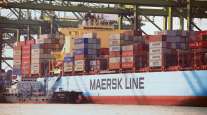Maersk to Split Group Into Separate Transport, Energy Companies

A.P. Moeller-Maersk A/S will split into separate transport and energy businesses as Denmark’s biggest company moves ahead with an historic shake-up of the conglomerate.
Maersk, owner of the world’s biggest shipping firm, will become a transport and logistics company, the Copenhagen-based group said Sept. 22. Oil and oil related businesses, “either individually or in combination,” will be separated from the group, it said.
Goldman Sachs characterized the move as a “clear opportunity to unlock value,” in a note to clients. “Refocusing capital and management attention on transport, where we believe Maersk has clear competitive advantages, should lead to higher growth and return on capital in the medium term.” Exiting oil could also “unlock significant” sum-of-the-parts value, Goldman said.
RELATED: Hanjin bankruptcy tip of the iceberg for flailing shippers
“We continue to see Maersk’s valuation as attractive, failing to reflect either ongoing shipping market repair or the increasingly evident scope for unlocking SOTP value,” Goldman said.
Soren Skou, the group’s CEO since July 1, said the container line business will now focus more on acquisitions and rely less on ordering new ships to achieve growth. “There are already enough ships in the world,” he said at a press conference after the announcement. The company has also indicated it’s getting more client requests since the recent collapse of Hanjin Shipping Co.
Maersk also said its chief financial officer, Trond Westlie, will be replaced by Jakob Stausholm, who’s currently in charge of strategy at Maersk Line. The switch was part of a broader management reshuffle.
Chairman Michael Pram Rasmussen first revealed Maersk was assessing the merits of splitting up the group June 23, the same day he dismissed Nils Smedegaard Andersen as CEO. The prospect of a structural reorganization sent the shares up as much as 12% on the day, as most investors expect the company to be worth more once its different parts are freed from the conglomerate structure.
Maersk’s board expects the oil and oil-related businesses “will require different solutions for future development including separation of entities individually or in combination from A.P. Moeller-Maersk in the form of joint ventures, mergers or listing.” A solution is expected to be found within 24 months, it said.
Under Andersen, the 112-year-old group sold off a number of units that weren’t related to oil or shipping, including a stake in Danske Bank A/S and shares in a supermarket chain. But he had repeatedly defended the conglomerate structure, arguing the various business units benefited from the synergies that the group structure brought with it.




